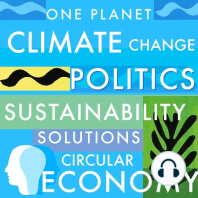20 min listen

MARK BURGMAN - Director, Centre for Environmental Policy, Imperial College London - Editor-in-Chief, Conservation Biology
MARK BURGMAN - Director, Centre for Environmental Policy, Imperial College London - Editor-in-Chief, Conservation Biology
ratings:
Length:
44 minutes
Released:
Mar 1, 2023
Format:
Podcast episode
Description
Mark Burgman is Director of the Centre for Environmental Policy at Imperial College London and Editor-in-Chief of the journal Conservation Biology. He is author of Trusting Judgments: How to Get the Best Out of Experts. Previously, he was Adrienne Clarke Chair of Botany at the University of Melbourne, Australia. He works on expert judgement, ecological modelling, conservation biology and risk assessment. He has written models for biosecurity, medicine regulation, marine fisheries, forestry, irrigation, electrical power utilities, mining, and national park planning. He received a BSc from the University of New South Wales, an MSc from Macquarie University, Sydney, and a PhD from the State University of New York at Stony Brook. He worked as a consultant ecologist and research scientist in Australia, the United States and Switzerland during the 1980’s before joining the University of Melbourne in 1990. He joined CEP in February, 2017. He has published over two hundred and fifty refereed papers and book chapters and seven authored books. He was elected to the Australian Academy of Science in 2006.“The idea of expertise and expert judgment has been around and has been something that society depends upon for a long time, but there have been no serious empirical explorations of who's an expert, what a domain of expertise is, and what sort of frailties are experts susceptible to. Those things haven't been addressed in an empirical way until the last 30 years. Some of this work began in the fifties with Kahneman and Tversky. They began to explore the things that make people misjudge risky situations, and that led to a body of research on who makes good judgments and under what circumstances for things that might affect us in various ways. But these were typically judgments about the probabilities of events and the magnitudes of the consequences. There's a domain in which we use experts to make judgments about future events, the quantities of things that we will see at some time in the future, or things that currently exist, but we don't know what they are. We don't have time yet, to compile the data that we need, and we rely on expert judgments in law courts, but also relied on them for example, we have a new disease like COVID, and we didn't know yet its transmission rates and yet we have to guess at its transmission rates to make judgments about how best to manage the population to protect ourselves. And we rely on expert judgments of all of those circumstances. And yet we don't know who the best expert is. Who should we ask? Is it the best-credentialed person? Is it the person that most people trust? If you ask two experts and you get two opinions, which one should you use? And so on and so forth. Now, that has been the focus of research over the last 10 or 15 years, and I've learned some really important things that run contrary to our intuition about some of those things.”www.imperial.ac.uk/environmental-policy www.conbio.orgwww.creativeprocess.info www.oneplanetpodcast.orgIG www.instagram.com/creativeprocesspodcast
Released:
Mar 1, 2023
Format:
Podcast episode
Titles in the series (100)
Noah Wilson-Rich · Co-founder/CEO, The Best Bees Company, Largest US Beekeeping service...: Interviewed by Mia Funk & Sydney Field · Associate Podcast Producer Sydney Field by Sustainability, Climate Change, Renewable Energy, Politics, Activism, Biodiversity, Carbon Footprint, Wildlife, Regenerative Agriculture, Circular Economy, Extinction, Net-Zero · One Planet Podcast